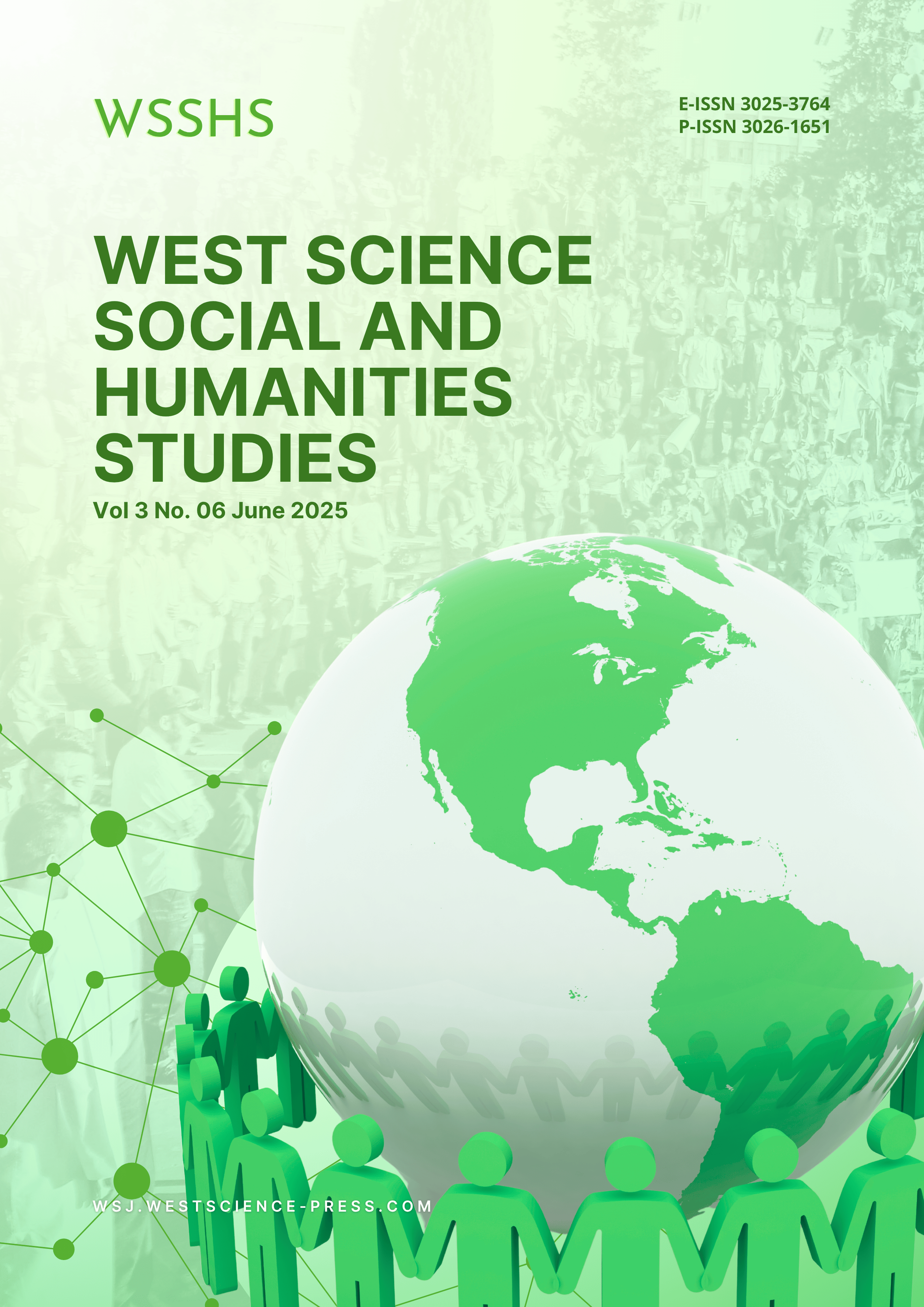The Study of College Students Subjective Well-Being Experiencing Online Learning: Examining the Role of Emotional Regulation and Social Support
DOI:
https://doi.org/10.58812/wsshs.v3i06.1958Keywords:
College Students, Emotion Regulation, Online Learning, Social Support, Subjective Well-BeingAbstract
This study uses a quantitative approach that aims to examine the role of emotional regulation and social support on the subjective well-being of students experiencing online learning as the impact of the COVID-19 pandemic. The research subjects were obtained through purposive sampling and amounted to 271 college students in Indonesia, consisting of 87 men and 184 women. The data collection instruments used in this study were the emotional regulation scale, the social support scale, and the subjective well-being scale of students. The results of the multiple regression analysis test proved that emotional regulation and social support played a significant role (p = 0.00) in the subjective well-being of students (R = 0.679). The results showed that the higher the emotional regulation and social support contribute to the higher level of student’s subjective well-being. In this study, it was found that the emotional regulation giving effective contribution of 28,6% and social support contributing 17,5% to the college students subjective well-being.
References
[1] R. Teguh, F.F Adji, V. Wilentine, H. Usup, and A. Sahay, “Dampak psikologis pandemik COVID-19 terhadap mahasiswa di Kalimantan Tengah,” Jurnal Teknologi Informasi, vol. 14, no. 2, 2020, doi: 10.13140/RG.2.2.26837.04321.
[2] E. Diener, “If, why, and when subjective well-being influences health, and future needed research,” Applied Psychology: Health and Well-Being, vol. 9, no. 2, 2017, doi: 10.1111/aphw.12090. PMID: 28707767.
[3] E. O’Connor, “Student well-being: A dimension of subjective well-being?,” B.S. thesis, Deakin University, Australia, 2005.
[4] J.J. Gross, “Emotion regulation: Conceptual and empirical foundations,” In Handbook of emotion regulation, J. J. Gross (Ed.), 2nd ed., 2014 pp. 3–20. The Guilford Press.
[5] M.D.Y. Santoso,” Review Article : Dukungan Sosial dalam Situasi Pandemi COVID-19,” Jurnal Litbang Sukowati, vol. 5, no. 1, pp 11-26, 2021, https://doi.org/10.32630/sukowati.v5i1.184
[6] J.W. Santrock, Life-Span Development, 17th ed. New York, NY, USA: McGraw-Hill Education. 2019.
[7] Z.F. Intani and A. Indati, “Peranan Wisdom terhadap Subjective Well-Being pada Dewasa Awal,” Gadjah Mada Journal of Psychology, vol. 3, no. 3, 2017, https://doi.org/10.22146/gamajop.44105
[8] W.A. Nuria, “Hubungan antara Regulasi Emosi dengan Subjective Well-Being pada Mahasiswa Tingkat Akhir Prodi Bimbingan Konseling Islam Fakultas Dakwah dan Ilmu Komunikasi UIN Mataram,” B.S. thesis, UIN Mataram, Indonesia, 2022.
[9] S.D.A. Amelia, M.I.F. Baihaqi, and E. Kosasih, “Persepsi Dukungan Sosial sebagai Mediator Pengungkapan Diri dan Kesejahteraan Subjektif pada Pengguna Instagram,” Mediapsi, vol. 6, no. 1, pp 58-66, 2020.
[10] E. Diener, “Subjective well-being” Psychological Bulletin, American Psychological Association, vol. 5, no. 3, pp 542-575, 1984.
[11] E. Diener, E. Suh, and. S. Oishi, “Recent findings on subjective well-being,” Indian Journal of Clinical Psychology, vol. 24, pp 25-41, 1997.
[12] E. Diener, The science of well-being: The collected works of Ed Diener, social indicators research series. Springer. 2009.
[13] J.J. Gross, Handbook of Emotion Regulation. The Guillford Press. 2007.
[14] J.J. Gross and R.A. Thompson, Emotion Regulation: Conceptual Foundations. J.J. Gross, Ed. The Guillford Press. 2007.
[15] G.R. Pierce, B.R. Sarason, I.G. Sarason, H.J. Joseph, and C.A. Henderson, “Conceptualizing and assessing social support in the context of the family,” In Handbook of social support and the family, G. R. Pierce, B. R. Sarason, & I. G. Sarason (Eds.), 1996, pp 3-23. Plenum Press, https://doi.org/10.1007/978-1-4899-1388-3_1
[16] G.D. Zimet, N.W. Dahlem, S.G. Zimet, and G.K. Farley, “The multidimensional scale of perceived social support,” Journal of Personality Assessment, vol. 52, no. 1, pp 30-41, 2010. https://doi.org/10.1207/s15327752jpa5201_2
[17] M.S. Utami, “Skala Kesejahteraan Subjektif Mahasiswa,” unpublished.
[18] A. Bahirah, “Hubungan regulasi emosi dan perhatian orang tua dengan social problem solving remaja SMA cahaya madani banten boarding school” B.S. thesis, Universitas Sebelas Maret, 2016, unpublished.
[19] R.N. Azlyna, “Hubungan antara dukungan sosial dengan kesejahteraan subjektif pada remaja penderita scoliosis” B.S. thesis, Universitas Islam Indonesia, 2020, unpublished.
[20] S.L. Restubog, A.C.G. Ocampo, and L. Wang, “Taking control amidst the chaos: Emotion regulation during the COVID-19 pandemic,” Journal of Vocational Behavior, vol. 119, 2020. https://doi.org/10.1016/j.jvb.2020.103440
[21] Y. Wilujeng, A.N. Priyatama, and P.A. Satwika, “Hubungan antara Regulasi Emosi dan Dukungan Sosial dengan Subjective Well-Being pada Yogini di Hatha Yoga Ganep’s,“ B.S. thesis, Universitas Sebelas Maret, 2014.
[22] M. Yildirim and F. C. Tanriverdi, “Social support, resilience and subjective well-being in college students,” Journal of Positive School Psychology, vol. 5, no. 2, pp 127-135, 2020.
[23] A. Brajša-Žganec, L. Kaliterna, and I.V. Marković, “The relationship between social support and subjective well-being across the lifespan,” Drustvena istrazivanja, vol. 27, pp 47-65, 2018. https://doi.org/10.5559/di.27.1.03
[24] M.A. Montpetit, N.A. Nelson, and S.S. Tiberio, “Daily interactions and affect in older adulthood: Family, friends, and perceived support,” Journal of Happiness Studies: An Interdisciplinary Forum on Subjective Well-Being, vol. 18, no. 2, pp 373-388, 2017. https://doi.org/10.1007/s10902-016-9730-4
[25] J.M. Diefendorff, E.M. Richard, and J. Yang, “Linking emotion regulation strategies to affective events and negative emotions at work,” Journal of Vocational Behavior, vol. 73, no. 3, pp 498-508. https://doi.org/10.1016/j.jvb.2008.09.006
Downloads
Published
Issue
Section
License
Copyright (c) 2025 Arifatul Bahirah, Tukhas Shilul Imaroh

This work is licensed under a Creative Commons Attribution-ShareAlike 4.0 International License.




















 Instagram
Instagram 